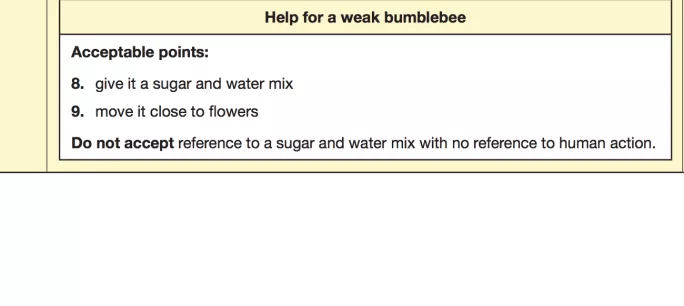Teachers have criticised an “infuriating” marking scheme on the key stage 2 reading Sats test, which led to some pupils getting no marks for a question about bumblebees.
In the test, taken by around 600,000 10- and 11-year-olds in May, pupils were asked to read a fact sheet about helping bumblebees and then answer questions.
The mark scheme says that when pupils answer about help for a weak bumblebee “give it a sugar and water mix”, it is worth one mark, but “sugar and water mix” is not acceptable and gets nothing.
Quick read: 65 per cent achieve expected standard in three Rs
Maths: ‘Tricky’ maths test left children in tears
Sats results 2019: All you need to know
According to the scheme, this is because the latter answer does not demonstrate a human action.
However, teachers have taken to social media to criticise this.
Posting on Twitter, headteacher Jim Garbutt said: “Some of the Sats suggestions in the mark scheme infuriate me.
“Complete the table to show how to help a struggling bee. Sugar and water no marks. Get sugar and water gets a mark…What education world do I now inhabit?”
Another teacher replied that her school had pupils who had missed the expected standard in the test by one mark after answering “sugar and water”.
The question had asked pupils to read from two columns: one headed “Help for all bumblebees” which needed two entries, and one headed “Help for a weak bumblebee” which needed one entry. There were two available marks.
A Department for Education spokesperson said: “The development of the mark schemes is rigorous and carefully considered, involving educational professionals and marking experts.
“It ensures that children who answer the questions correctly are rewarded with a mark that reflects their level of understanding of the questions.”
Marking schemes used in national tests have been a source of major controversy in recent years.
There was widespread anger over the spelling punctuation and grammar (Spag) test in 2017 after it emerged that some pupils received no marks for a correctly placed semicolon because the comma part had been backwards.
More than 550,000 pupils took the test, which included a question asking them to put a semicolon in the correct place in the sentence “Come and see me tomorrow I will not have time to see you today”, which the mark scheme said would earn them one mark.
When results were returned to schools, teachers queried why pupils hadn’t got the mark despite putting the punctuation in the correct place, after the word “tomorrow”.
It turned out that as well as the published mark scheme, Pearson, the company that runs the marking, had given extra guidance to markers saying that the shape, size and orientation of punctuation marks must also be taken into account.
“The orientation of the comma element of the semicolon must be inclined to the left or straight down. It cannot include to the right,” markers were told.
This year Standards and Testing Agency, which oversees the tests, has informed headteachers that in this year’s Spag test, markers will accept “reversed punctuation marks, for example, commas and semicolons presented backwards”.






